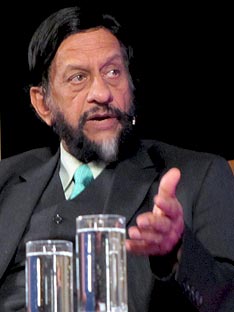Jan 14, 2015, San Francisco
Rajendra Pachauri, Ph.D., Chair (former), Intergovernmental Panel on Climate Change appeared at the Fairmont Hotel in San Francisco last month along with Lisa Jackson, Vice President, Environmental Initiatives, Apple and Former Administrator of the EPA to be interviewed by Greg Dalton of Climate One of the Commonwealth Club. Subsequently Pachauri has resigned his position as IPCC chair amidst accusations of sexual harassment in Delhi. Excerpts of Dr. Pachauri’s comments:

“…if you look at the increase in emissions between 2000 and 2010 … we’ve been adding one gigatonne per year over previous levels in this ten year period. That goes counter to what the UN framework convention on climate change requires”
text transcription (from 20:14 onwards):
“Well, I think that if you really want to limit warming to 2 degrees Celsius, then the peak in global emissions should really not come after 2025. Earlier preferably, because otherwise the cost of mitigation will go up substantially, and the feasibility of coming up with solutions and technologies would go beyond our reach. So I think the sooner we act, the better it will be, and of course we’ll have to act quite decisively, because unfortunately, if you look at the increase in emissions between 2000 and 2010, in 2010 the world was emitting 49 gigatonnes of CO2 equivalent [GtCO2eq], in the year 2000 it was emitting 39 gigatonnes, so that means we’ve been adding one gigatonne per year over previous levels in this ten year period. That goes counter to what the UN framework convention on climate change requires.”
“So I think that we need to move very quickly, and the big thing is you can actually save money in a number of cases by taking the right kind of actions. I mentioned co-benefits. I also want to mention that we have found that the cost per year would be 0.06% of global GDP or global consumption if we were to pursue a path takes us to no more than 2 degrees Celsius. So it’s not an expensive proposition. It’s difficult because we’ve got accustomed to very very high rates of growth in emissions, so the turnaround is difficult, but once we decide to do that the cost is not high at all”
Report by James George



























































